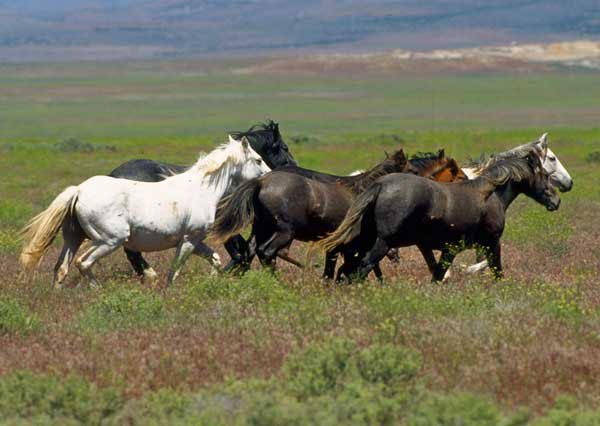
January 7, 2018; San Antonio Express-News
When it comes to management of wild horses, Tami Fawcett has a few ideas on what we can do to be both proactive and compassionate to the plight of these gentle giants in 2018.
Fawcett is the founder of the nonprofit Mustangs MEND—Mindfulness, Empathy, Nurturing, Dignity, which came into existence in the summer of 2017 from her Oregon home. Her latest charges are seven mustang colts rescued from a Nevada kill pen. These three- to eight-month-old “kids,” as she calls them, came from tribal lands in Nevada, where their fate was dim. They were headed straight for slaughter until she intervened. (Fawcett says that thousands of mustangs are sold each year and transported into Mexico or Canada to be processed for both human consumption and dog food.)
Sign up for our free newsletters
Subscribe to NPQ's newsletters to have our top stories delivered directly to your inbox.
By signing up, you agree to our privacy policy and terms of use, and to receive messages from NPQ and our partners.
The plight of the rescued colts is far from unusual; in fact, it will play out thousands of times this year, as communities and tribal entities struggle with the resources and costs associated with herd management. The Democrat-Herald reports there are thousands of mustangs on Native American tribal lands spread across the United States. The tribes do not have funds to manage the horses, and in turn, the horses suffer from lack of food and the tribal lands suffer from overgrazing.
Nor is it just tribes that struggle with this issue. Elsewhere in Nevada, there is still no update available on the fate of “Annie’s Herd.” NPQ brought readers the story last year of the questions that hang over the fate of the herd after a December vote by the Nevada Board of Agriculture. The group voted 8–1 to hand over control of as many as 3,000 wild horses in the Virginia Range to a yet-to-be-determined nonprofit group in a year-end move that angered wild horse enthusiasts, who say it puts the horses at risk of slaughter and at the mercy of business interests. NPQ questioned the pattern of the government sector handing over a problem to the nonprofit sector that they can’t or won’t get their arms around themselves.
As for the colts currently in her care, Fawcett’s new year’s wish is to get all of them into good, vetted homes. Mustangs, she told news outlets, can be gentled into fine riding horses and maybe even more. One of her rescued horses was named the In-Hand Reserve Champion at the 2017 Oregon State Fair. Fawcett hopes we can come together, get beyond politics, and think about managing the wild mustang population long-term.—Carrie Collins-Fadell













